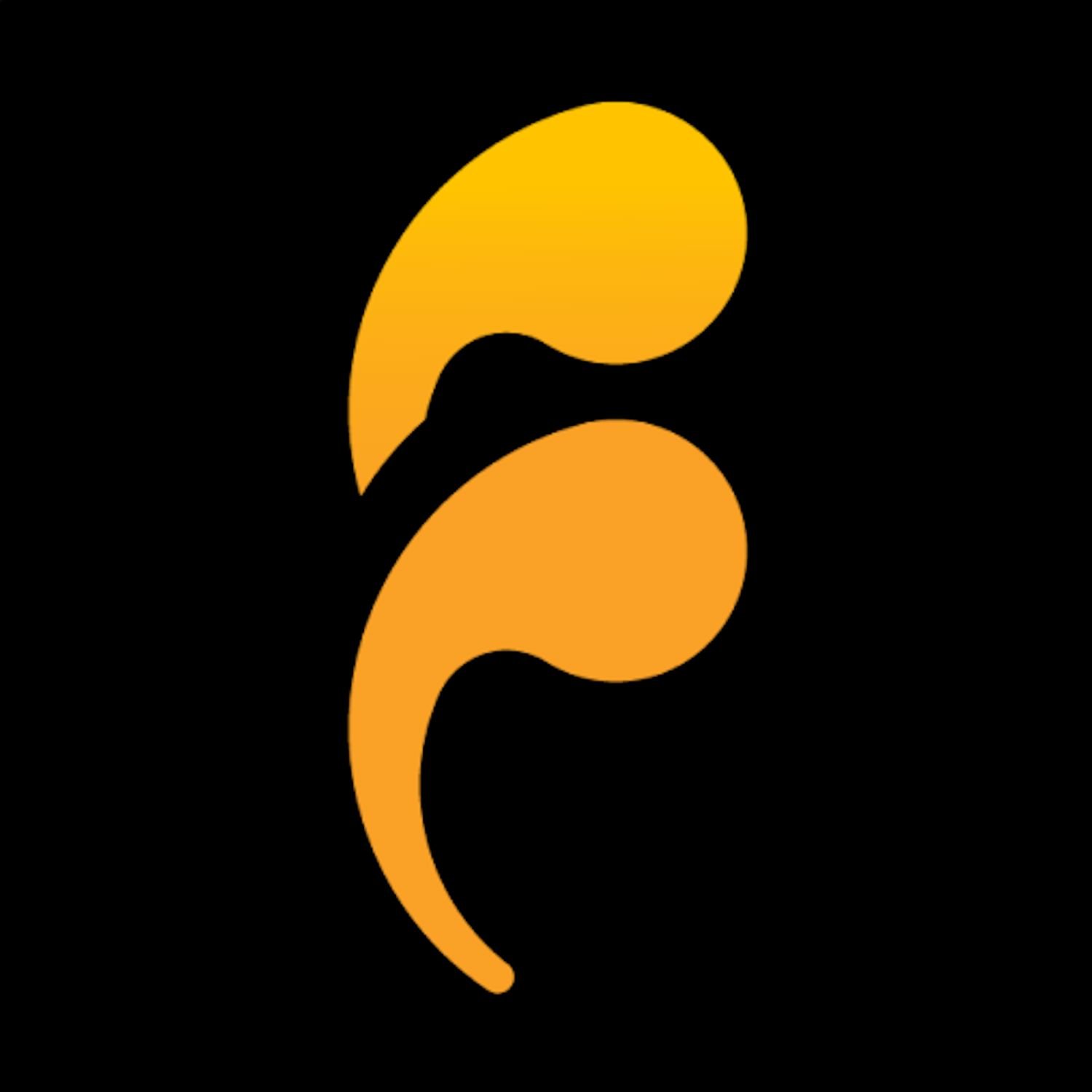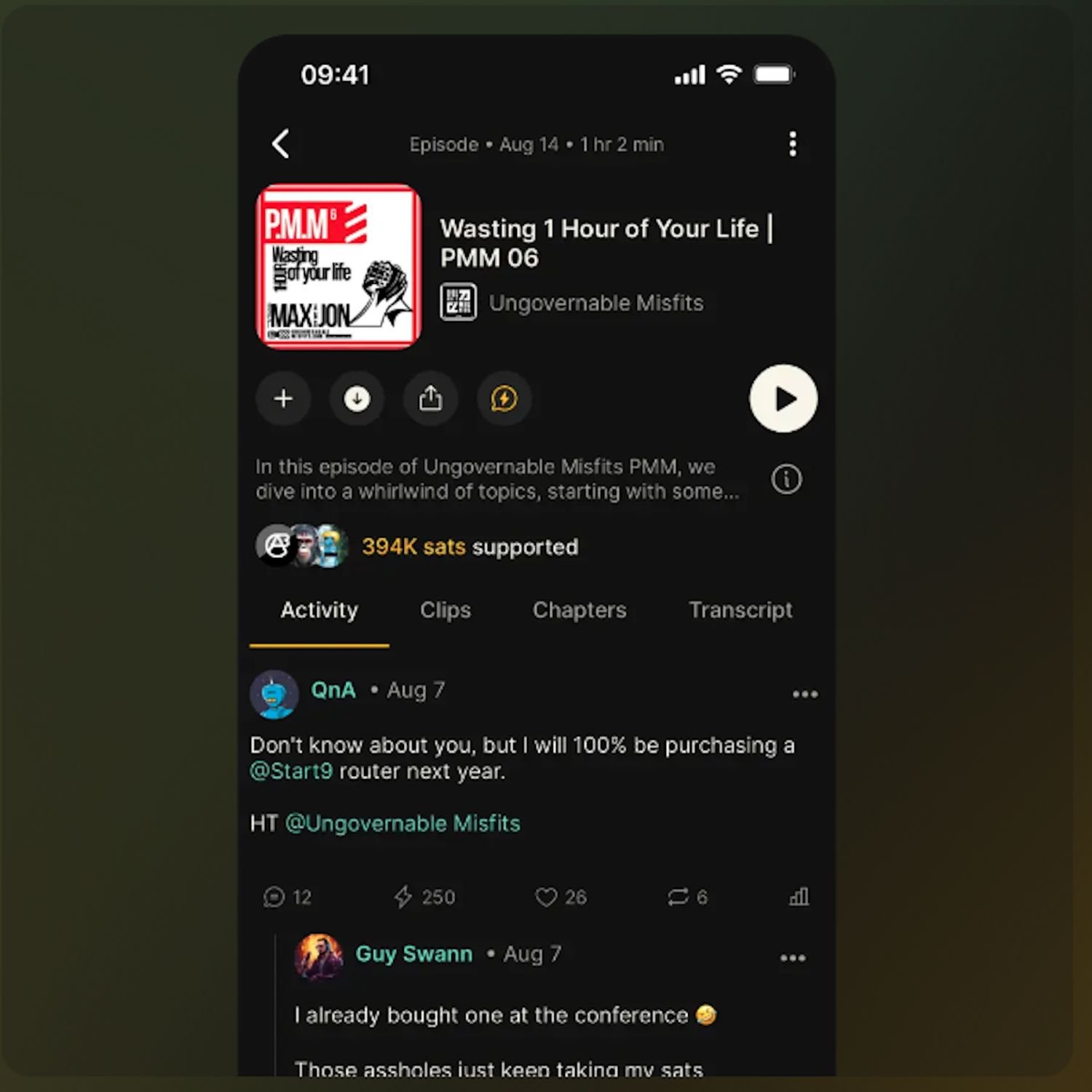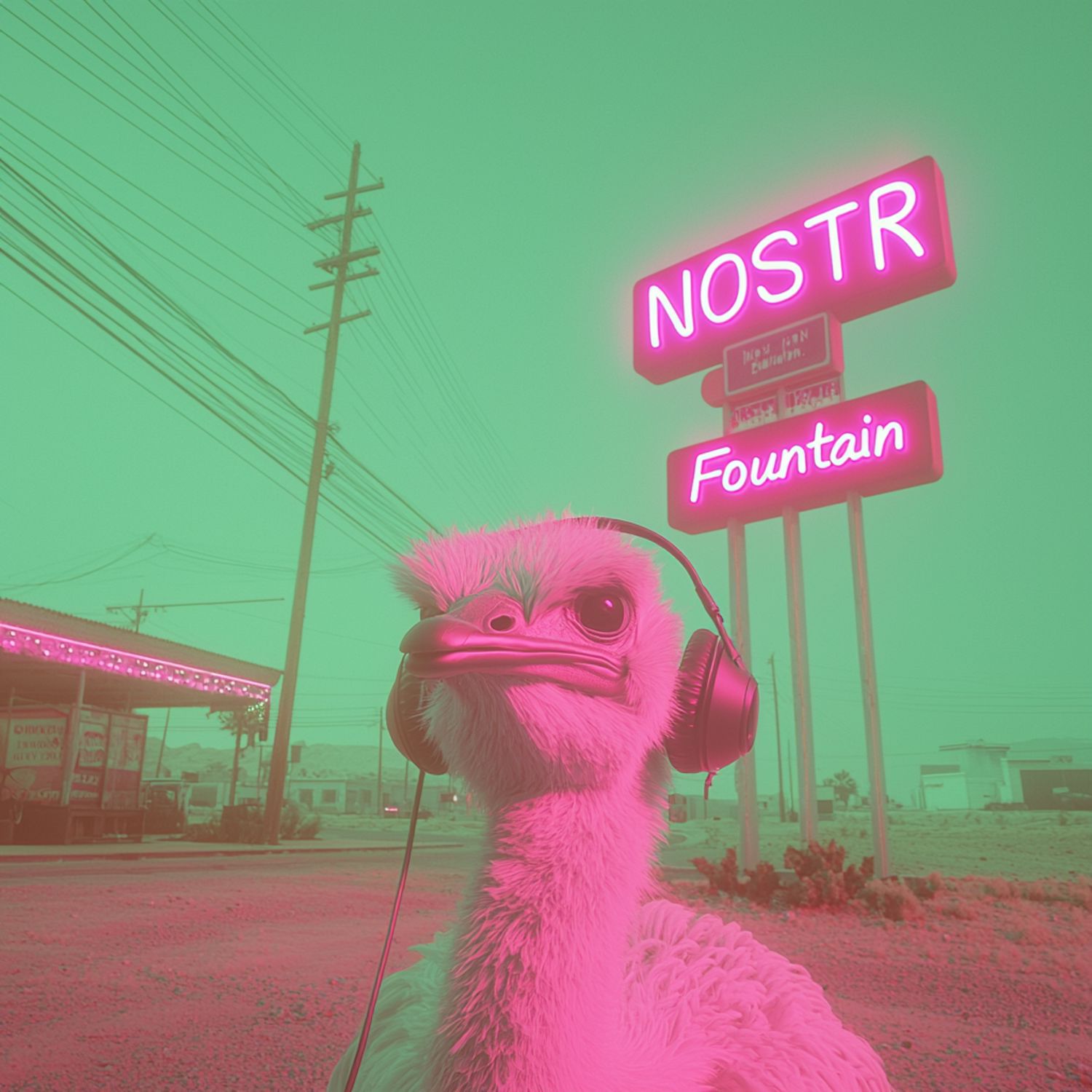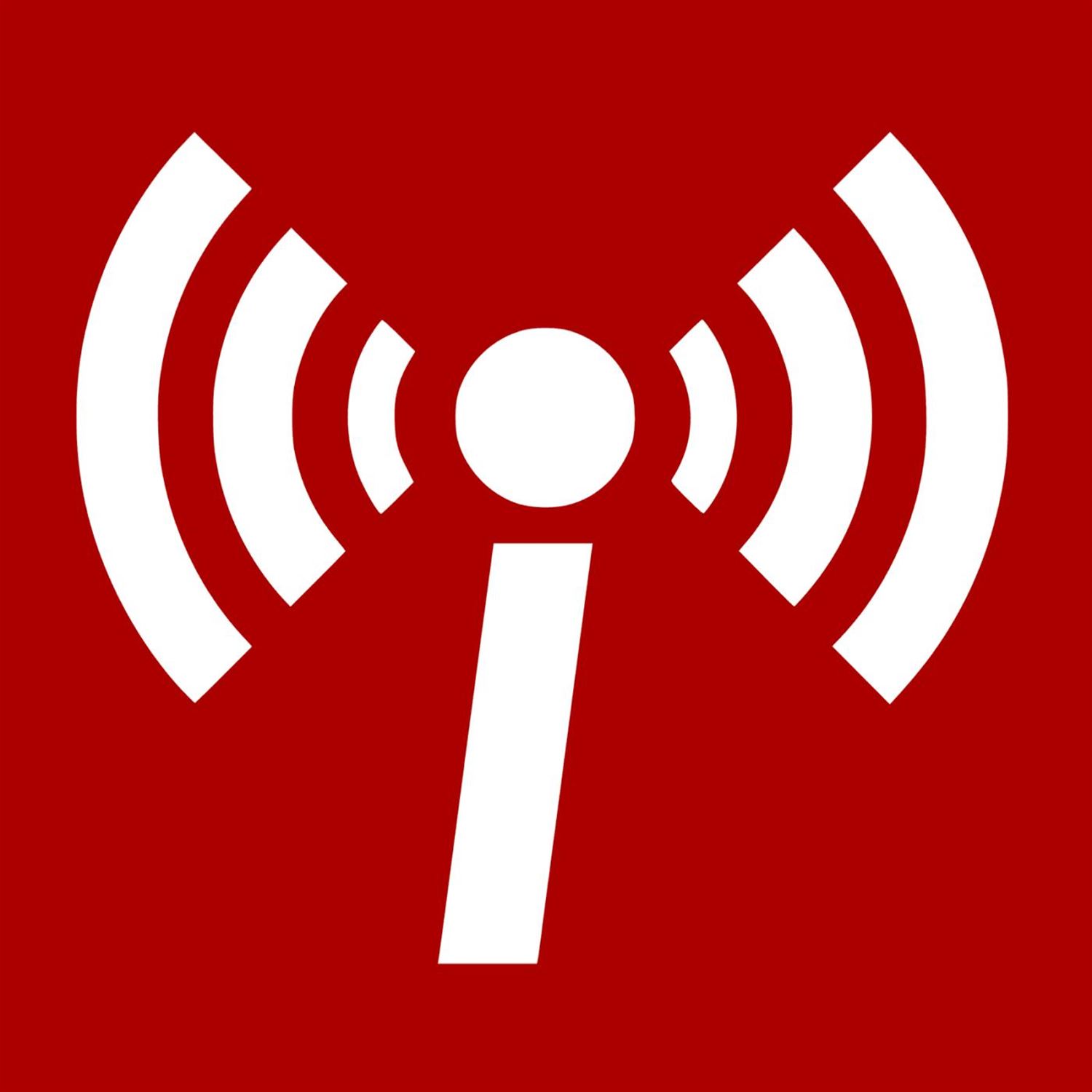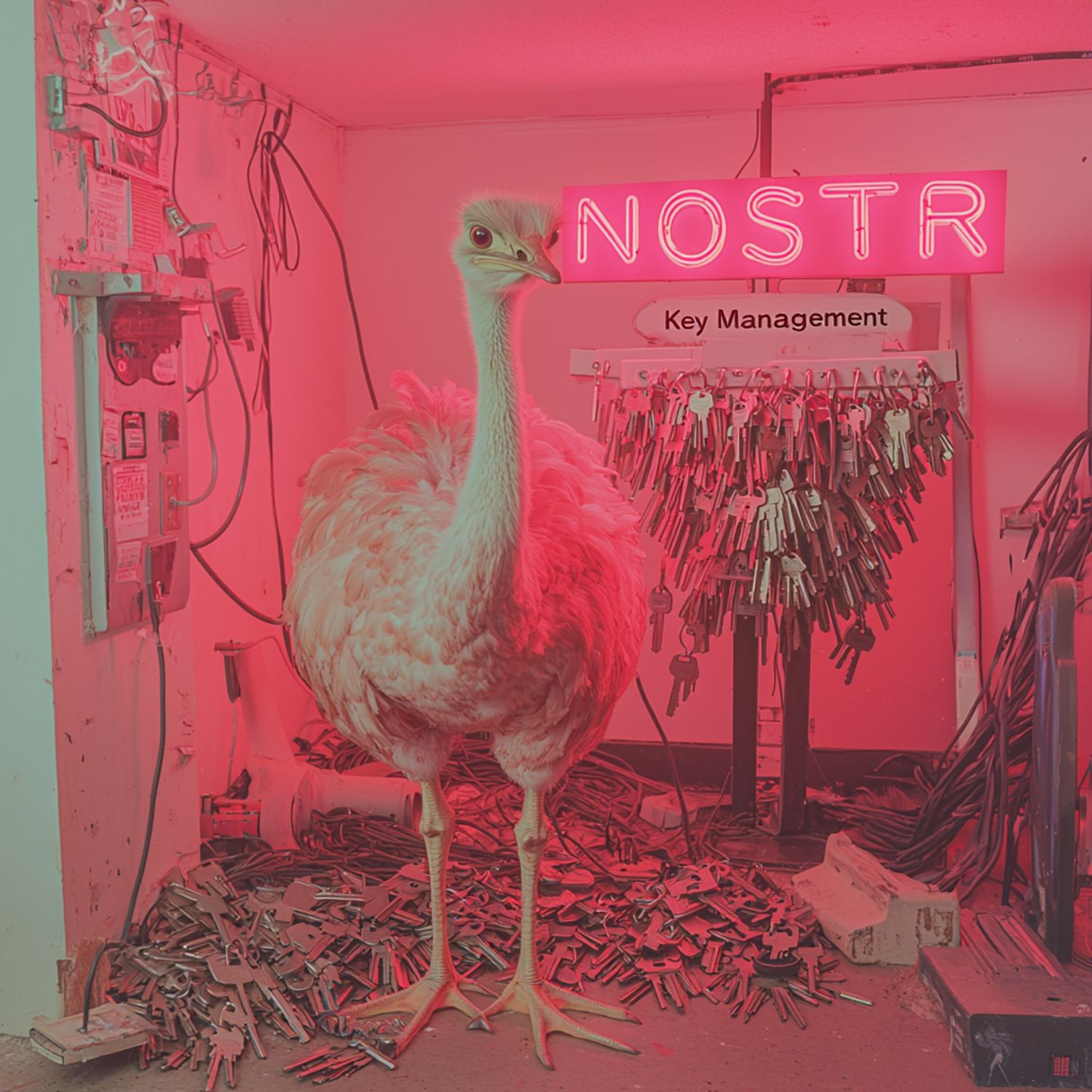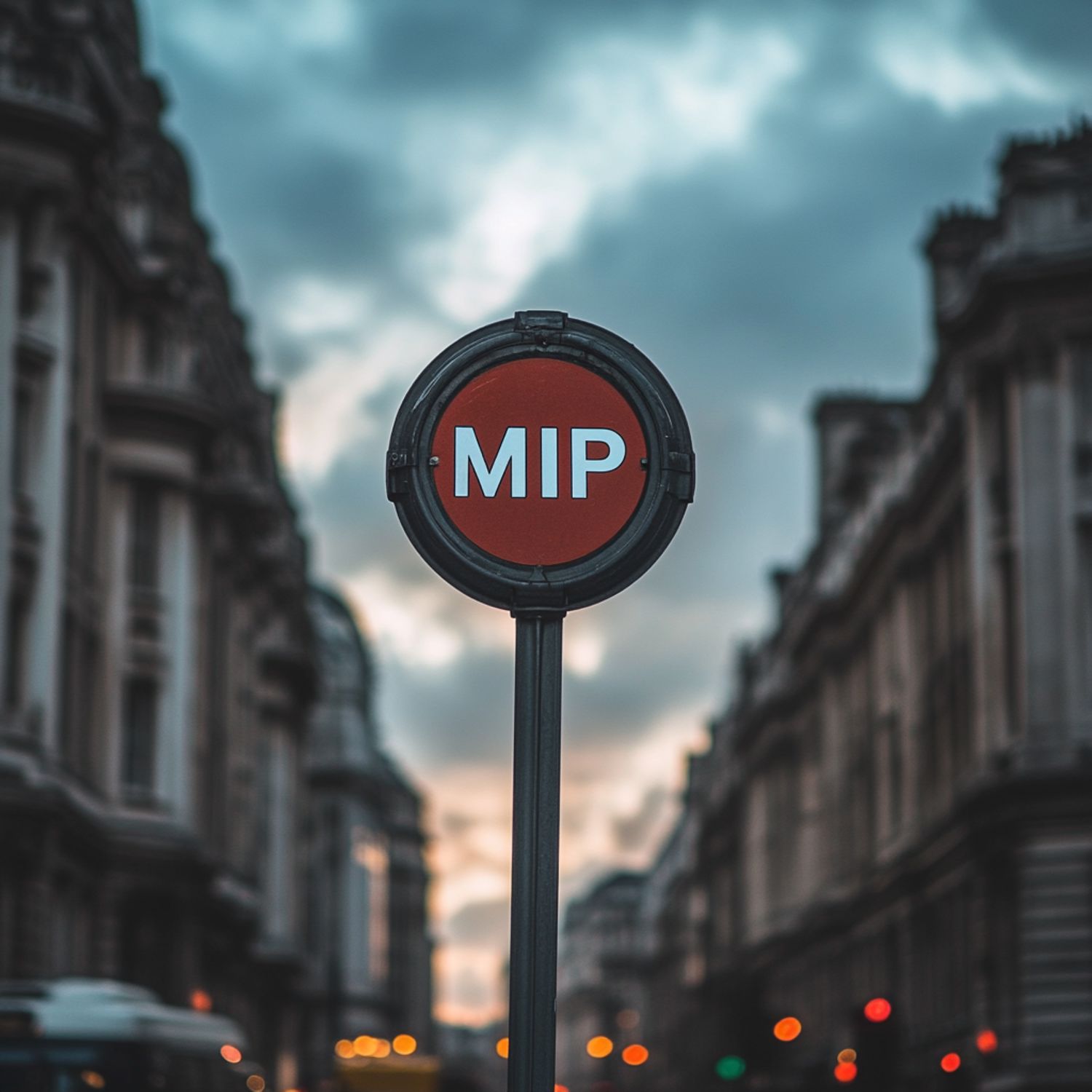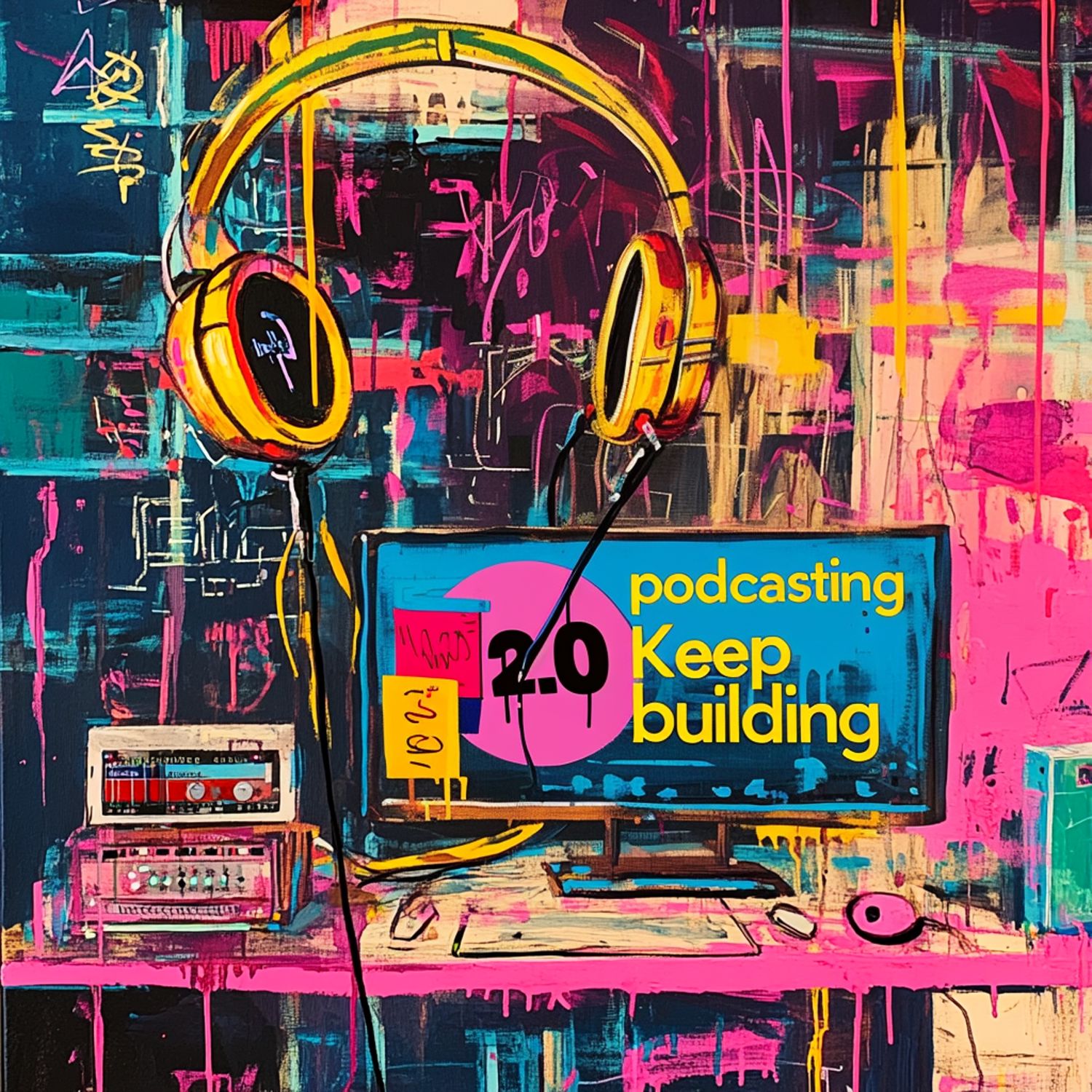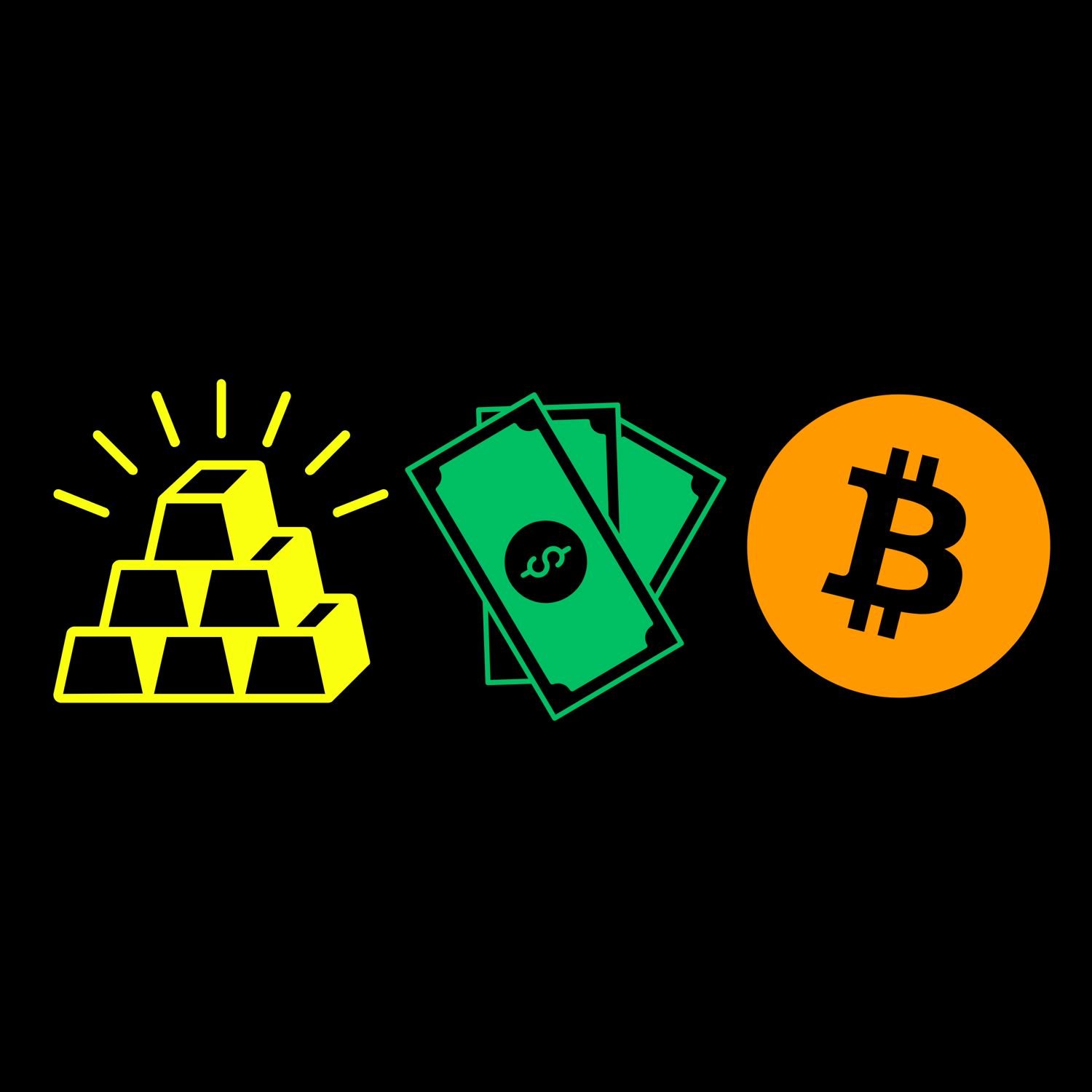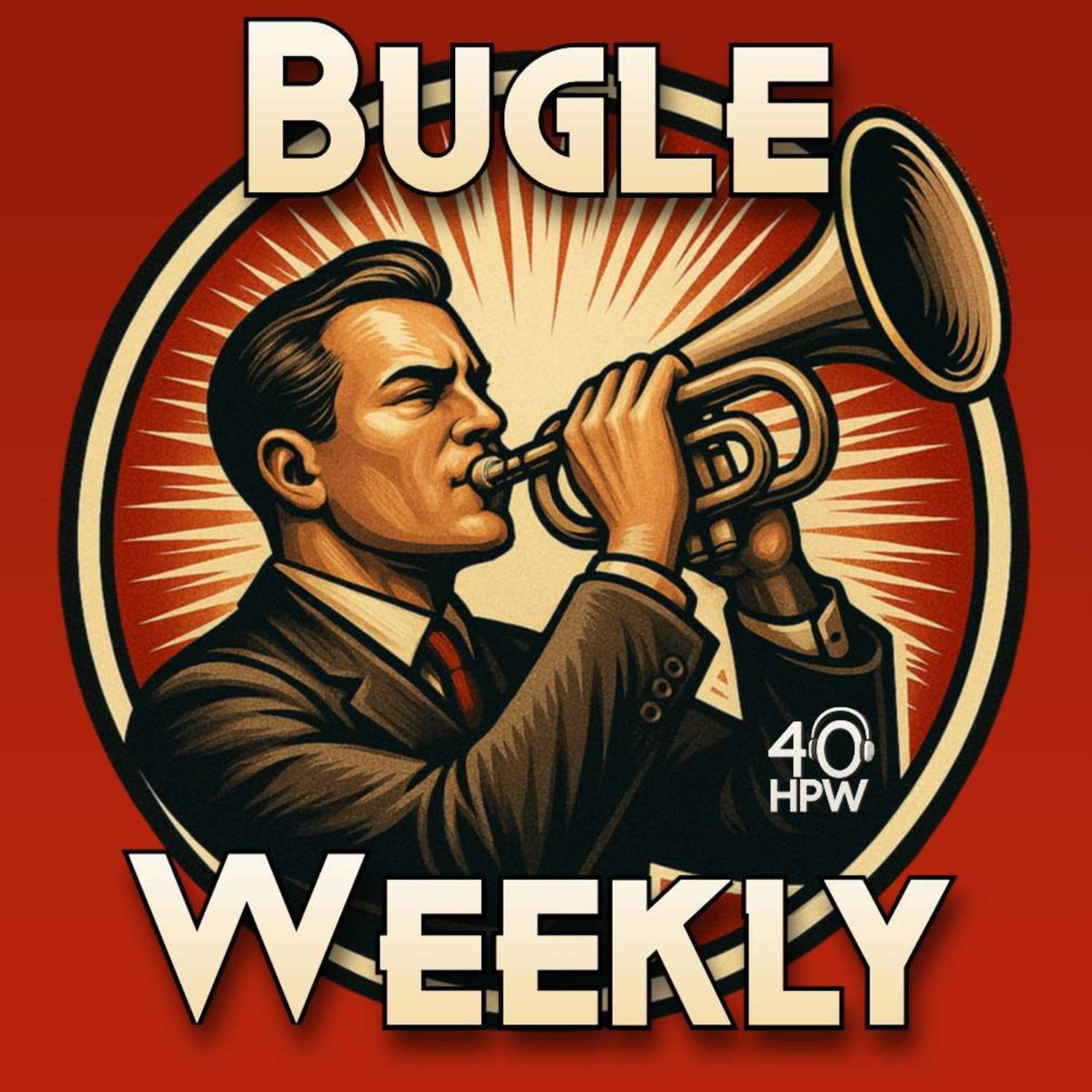Welcome to the The Confab, the term derives from "confidential talk", which was commonly used in the Prohibition Era for meetings and conversations that took place in the smoky, rule-breaking speakeasies of that time.
The informal, privacy focused and clandestine nature of Ungovernable Misfits lends itself to these discussions. So, grab a seat and a stiff drink from the concealed bar, listen and revel in the conversation.
On this episode, Fountain creator and developer, Oscar Merry joins Max for a coffee to discuss all things podcasting, Nostr and Fountain.
SHOW DISCUSSION
Oscar shares insights into the goals of Fountain, particularly in enhancing user experience with Lightning and making podcasting more accessible and valuable for both listeners and podcasters.
We also explore the challenges and opportunities presented by Nostr, a protocol that Oscar believes will be the social layer of open podcasting. We discuss the integration of Nostr into Fountain, the potential for cross-app interactions, and the importance of an open, collaborative approach to podcasting. Oscar addresses the complexities of key management in Nostr and shares his optimism about the protocol's future.
Throughout the conversation, we reflect on the importance of community feedback and the role of open-source collaboration in challenging major platforms like Spotify and Apple Podcasts. Oscar's commitment to improving Fountain and his vision for the future of podcasting 2.0 powered by Lightning and Nostr are both inspiring and promising.
[[LINKS]]
SHOW SPONSORS
FOUNDATION
https://foundation.xyz/ungovernable
Foundation builds Bitcoin-centric tools that empower you to reclaim your digital sovereignty.
As a sovereign computing company, Foundation is the antithesis of today’s tech conglomerates. Returning to cypherpunk principles, they build open source technology that “can’t be evil”.
Thank you Foundation Devices for sponsoring the show!
Use code: Ungovernable for $10 off of your purchase
CAKE WALLET
https://cakewallet.com
Cake Wallet is an open-source, non-custodial wallet available on Android, iOS, macOS, and Linux.
Features:
- Built-in Exchange: Swap easily between Bitcoin and Monero.
- User-Friendly: Simple interface for all users.
Monero Users:
- Batch Transactions: Send multiple payments at once.
- Faster Syncing: Optimized syncing via specified restore heights
- Proxy Support: Enhance privacy with proxy node options.
Bitcoin Users:
- Coin Control: Manage your transactions effectively.
- Silent Payments: Static bitcoin addresses
- Batch Transactions: Streamline your payment process.
Thank you Cake Wallet for sponsoring the show!
VALUE FOR VALUE
Thanks for listening you Ungovernable Misfits, we appreciate your continued support and hope you enjoy the shows.
You can support this episode using your time, talent or treasure.
TIME:
- create fountain clips for the show
- create a meetup
- help boost the signal on social media
TALENT:
- create ungovernable misfit inspired art, animation or music
- design or implement some software that can make the podcast better
- use whatever talents you have to make a contribution to the show!
TREASURE:
- BOOST IT OR STREAM SATS on the Podcasting 2.0 apps @ https://podcastapps.com
- DONATE via Monero @ https://xmrchat.com/ugmf
- BUY SOME STICKERS @ https://www.ungovernablemisfits.com/shop/
(05:53) Talk Coffee To Me
(07:04) Fountain's Journey and Achievements
(08:57) Fountain's Goals and Vision
(12:18) Podcast Discovery and Social Features
(18:25) The Transition to Nostr
(35:14) The Importance of an Open Podcasting Ecosystem
(43:14) Key Management Concerns
(54:10) Max's Improvement Proposals
Bitcoin is close to becoming worthless. Bitcoin. Now what's the Bitcoin?
[00:00:19] Unknown:
Bitcoin's like rat poison. Yeah.
[00:00:22] Unknown:
Oh. The greatest scam in history. Let's get it.
[00:00:27] Unknown:
Bitcoin will go to fucking 0. Welcome back to another Comfab episode. This episode is with Oscar Merry from Fountain. We've talked about doing this for a while. Many of you listening now will be using Fountain. You'll have noticed some updates recently and the integration with Nosta. So we got into all of that, and I really enjoyed talking to Oscar. I think it's really cool that him and the team are so open to feedback and that they're on the bleeding edge. I think what they've built is incredible. And if you enjoy using it or you have any questions, you can reach out directly to them, or you can send us a boost because this is a conversation we'll keep going.
I wanna say thank you to everyone who's been boosting the last episode. The last confab was with seed signer at pojammies with 20,000 sats. The balance of work and family is getting out of hand. I fully agree. A full reset is required from time to time. Biz, rock and roll, guitar, or simply hide away in the forest and go to the sauna, switch off, and ground yourself. BTC Curacao. 20,000 sats. Hi from Curacao. Hello from Curacao. It looks absolutely beautiful. For anyone who missed that episode, go and check it out. I think I'm gonna have to find my way there. It looks stunning. And thank you for the sats. Chad Farrow, Podverse.
10000 stats. 8 with 7,777 says good conversation. Late stage huddle with 7,000 stats. I don't have any more sats right now. Sorry. Love you long time. Love you long time too, mate. Chad Farrow again. Keep up the great work at and crew. Wartime, 3,333 SATS with fire and beer emojis. Thank you to everyone who sent in boosts. We really do appreciate it. And now a quick thank you to our sponsors before we jump in. I'm very excited to announce that we will be working with Cake Wallet. Cake Wallet, if you haven't already heard of them, have been around for a long time. They've got an incredible reputation in the space.
They're fully open source. They're available on Android, iPhone, Mac, Linux, Windows. I think basically any operating system you can think of. When I was looking for a new sponsor, these guys were right at the top of my list. Firstly, they have an incredible team. My good friend, Seth, has just joined their team, which fills me with confidence. Me and q and a have been watching what this team has been doing for a while now, and I've been really impressed. They've added coin control, silent payments, batch transactions, and the ability to connect your Bitcoin and or Monero node.
Put simply, it makes it incredibly easy to actually use your Bitcoin and Monero. Keep yourself private and secure. Check them out at cakewallet.com. If you haven't already, then download it today. Have a play around. And if you have any questions, you can reach out to me. If it's too technical, I'll pass you on to Seth or the rest of the team. That's cakewallet.com. I also wanna say a huge thank you to Foundation. They've been supporting me for a fair few years now, and they've really helped this show grow. They also make the best hardware out there. It's not up for debate.
It's beautifully designed. It's fully open source. You can control all your keys from this device, including making child seeds with BIP 85. As an example, you can have your passport running. And from your master seed, you can create a second seed that you could put into your cake wallet. All of their features are very accessible. Q and a spends a huge amount of time making making very simple to follow instructions in video and text format. Oh, and while I think about it, in this episode, we literally talk about creating keys for and wanting those to be created offline.
Well, you can do that in the passport. You can do that in their key manager feature. There's a video that we can link in the show notes, or if we forget to do that, you can reach out. But it's on the foundation website. I won't spend all day blabbing on, but if you've been listening to this show for a while and you haven't already bought one of these devices, you're doing it wrong. They're fucking incredible. I wouldn't consider anything else for my friends or family. And if you have any questions, you can reach out and ask me. Check them out at foundation.xyzed, and use the code Uncoverable to get a discount and let them know that I'm shilling.
Enjoy the show. Morning, Oscar. How are you doing? Hey, Max. How's it going? Very well. I've got a coffee in hand.
[00:06:00] Unknown:
Snuffling away a little bit. It's that time of year, but other than that, I'm good. How are you? Yeah. Yeah. I'm doing well. Thanks. Yeah. It's definitely got a bit cold over the past few weeks, but, yeah, it is what it is.
[00:06:12] Unknown:
You got a coffee in hand or? I do. Yeah. I do. What is your coffee of choice?
[00:06:19] Unknown:
I tend to go for very milky coffees. Okay. Yeah. Like a latte or something? Yeah, like a latte or if I'm just making it myself, just lots of, lots of milk, yeah. A bit weird. Raw milk or No. Just regular regular cow's milk from the shops.
[00:06:38] Unknown:
I'm not on that train yet either. I'm sure you see it all over Bitcoin Twitter. Yeah. I don't think it's illegal here. Like, we don't have the same problems as we do in the US. I think you can just go and buy it from most farms. I just haven't done it yet. Yeah. I've I've I'm sure I've had it a few times before, but, you know, not really consciously in terms of going out there to buy it. Well, it's good to have you on the show. I feel like it's been a long time coming because, we've been using Fountain since the very, very beginning and really kinda growing the show through it. It's been one of our most exciting ways to interact with our audience and get to know people. And it seems like only yesterday, you and I had a conversation right at the beginning of when you were starting it and sort of giving ideas and feedback and stuff, and it's become like a a huge part of what we do. So before we sort of jump in properly, I just wanted to say congratulations for what you guys have achieved.
We've had our little gripes and things that haven't worked a 100% all the time, but it has helped us a lot. And it's been, as I say, a huge amount of fun to interact with people. So congrats for what you guys have achieved.
[00:07:59] Unknown:
Oh, thanks, Max. I really appreciate you saying that. And, yeah, it's definitely, you know, I think we've come a long way over the past couple of years but we're still very much in a place where there's a lot still to do. And I think specifically around the UX of Lightning as well, there's still so much more that we can do to make it easier for people and also just achieve some of the goals that we wanna achieve with Fountain to to make it more valuable for both listeners and podcasters. But, yeah, I really appreciate you saying that and, no worries at all about letting us know when, you know, things aren't working or stuff like that. Like, we really appreciate all the feedback. We're a really small team and so, yeah, all of the feedback that we receive, even if it is negative feedback, is incredibly helpful. And, yeah, I guess all I can say is that we we listen to all the feedback and we're constantly working to improve things. But I think overall, we've always had 2 main goals with Fountain.
The first is to help people discover great content that they might want to listen to. I've been a massive fan of podcasts for so many years and I think that the way podcasts work and have always worked in in the apps is that you have this kind of like inbox view where you're subscribed to a certain number of shows and the new episodes drop whenever they're released and that kind of like builds up your library in kind of like a reverse chronological order. And that's amazing and we don't want to change that. That's why the main library view in Fountain works in the normal way. But But I've always had this belief that there's other episodes out there that you maybe aren't interested enough to go and press that subscribe button on the show or go and add that to your kind of list of shows that populates your library. But there still may be episodes that you would find incredibly interesting just on a one off basis.
And I think that what we're trying to do and, you know, it's still very much an early aspect of the product. But we just wanna use the social features in Fountain to help you discover those one offs. And although, yeah, there's still a lot to do, I think we do see regularly these examples where whether it's in the home feed, whether it's in the charts, whether it's just in a comment that surfaces somewhere else in the app, that just gives you an opportunity to to think, oh yeah, I'll check out this episode, I'll add that single one to my queue'. So that's kind of like the number one for us. And then the other one is just to make lightning usable for mainstream podcasting.
And I think for that a lot of the shows that are having success with Fountain and Podcasting 2.0 more broadly do have, you know, a Bitcoin native audience and so for them, you know, some of the UX hurdles, to put it lightly, around Lightning are, you know, it's easy to overcome them. But what we really want to do is have Podcasting 2.0 powered by Lightning usable for all podcasters in a way where they don't have to go through the journey of onboarding to Bitcoin and onboarding to Lightning, they just use it because it's a better payment technology than the existing systems like Patreon. And I think that if we can do that, and I believe we can do that, we're getting we're getting there slowly, then we can just bring bitcoin and lightning to this entire industry, to the, you know, many hundreds of thousands of podcasters and many hundreds of millions of podcast listeners, and that they're not going to start using Lightning because they're necessarily believers in Bitcoin but they're just going to use it because it's a better payment technology.
Those are kind of two goals with Fountain and, yeah, as I say, there's still a lot to do. We need to make the app better for listeners, for podcasters. But, yeah, that I thought I'd just start by stating what our kind of goals are with it.
[00:12:19] Unknown:
Yeah. Well, I mean, the first point that you made about, like, finding podcasts and finding specific episodes you might be interested in. I think you guys do that pretty well. The fact that you've got the charts and what you used to have, I think you've removed it now, but the baller boost thing. And that was often how we would get found is, like, we've got very, very generous listeners who support us. And so what we'd find is someone would boost a show and they do a baller boost, and then people who are on found, so we'd be like, oh, okay. Well, someone's just sent them a 100,000 sats, you know. It must be good what they're doing. Yeah. So then they'd click on that and it takes them through. And I think, it's easy to get into a pattern where you just listen to the same stuff and you think, oh, I've got 40 minute drive now. This is my time. I could listen to a bit of a podcast, and I'm just gonna go to my old faithful because I haven't got time to be searching through and scrolling through, and I I don't wanna listen to something and it not be great. So I end up doing it. I'll end up often listening to Rogen even though I might not think he gets as in deep into some topics as I'd like. And there probably are people who would do a better interview certain times, but he has good guests, and I'm like, I kinda know what I'm getting here so I'll just listen to this. But there are thousands and thousands and thousands of other podcasts that would be just as good or better and I don't check them out because I don't know. And they're not in front of my face, I suppose. Yeah exactly and I think, you know, it's interesting
[00:13:54] Unknown:
how people discover new episodes that aren't part of the list of shows that they subscribe to. You know, normally when you share something with a friend or like a family member or a colleague or whoever it is, probably what you would do is just send them the episode link, right? Maybe you'll send it in a messaging app or you know over a DM. And I've always thought that that experience doesn't really work that well because the moment that you receive that episode link in the DM or in the chat message, you're often not really ready to think about listening to a podcast. You're kind of in the middle of the day doing something else, checking your messages, you're kind of at this like high time frequency of what you're doing. And I think that if you can take the sharing of episodes and bring that into the podcast app then it's much more likely that you're going to end up listening to it. And then when you factor in things like clips as well, it makes it easier for people to kind of digest what other people are sharing with them. Yeah, that's a good point. People send me episodes all the time like, oh, you should check this out, oh, this might be a good guest or this would be a good thing or put and it's like,
[00:15:03] Unknown:
like you say, as soon as you see it, you're like, yeah, I'll get back to that. And then you've got Telegram, Signal, WhatsApp, text messages, emails, Simplex, like, all these different apps across, for me, multiple different devices. And I'm like, fuck. Who sent me that? What message? What device? Oh, I can't remember. Fuck it. It doesn't matter. And you just move on. So I think that's true. Like, having it in one place and clips are quite a good way because to invest your time into a full podcast, 1, 2, 3 hour podcast someone sends you, it takes a while to sort of get into it. Mhmm. Get an understanding, like, what the flow is and sort of get used to the host and the guest and everything else. It takes a little bit of time. Whereas, like, a clip, if it's made correctly and you've got that little one minute or 2 minute, you're like, okay.
I could allow a minute or 2. And if it's not great, it's not the end of the world. I haven't wasted, like, hours of my time. It's much more acceptable for people, especially now because, like, I find myself getting bored and, like, anxious if there's anything that's longer than, like, a minute or 2 if someone sends it to me. I'm like, I've got other shit I need to go on with. Mhmm. The clips are, I think really really good. Yeah and I think that that's another example
[00:16:26] Unknown:
of where we've had the clips in Fountain since day 1 but they're still not really, I would say, optimised in the best way. And part of this, which I'm sure we'll get into, is the recent change to using Nosta. The ultimate goal for me is for any listener using Fountain to kind of be able to go on a little bit of a like discovery journey when they see that first bit of content. So whether that first bit of content is a boost or an episode comment or a clip, the ability to kind of go into that piece of content and then continue to browse around related information and, you know, find other episodes that I think would be so interesting. Like, imagine you see a clip on a really interesting niche topic that you've never really heard that much about.
The clip piques your interest, you listen to it, you like it, you could queue up the episode directly from the clip, that works today. But you could also, you know, click on one of the hashtags on the clip, browse more clips for that hashtag, see trending episodes related to that content. I think there's so much more that we can do there and, and for me personally, yeah, that's what it's all about. When you discover a new episode that's on something really, really niche that you don't really it's not part of your regular rotation. Like, personally that's what I love about the podcast medium is is how niche you can go and how you can all of a sudden be listening to, you know, an hour, hour and a half piece of content whilst you're, you know, driving or commuting or, you know, cleaning the house, whatever it is. And you can suddenly have all of this in-depth knowledge that is kind of just feeding into your brain. So that that's what I kind of want to achieve with Fountain and yeah, there's a lot more that we can do. But obviously the the big change recently has been the switch of the profile system to Nosto and I think that, yeah, like this was a this was a huge change for us.
It was essentially like rebuilding the social parts of the app from scratch and and that's a really hard thing to do normally. But when you're doing that with a system like Nosta where users manage their own identity, they have their own keys, and they sign all of their own messages, It's a million times harder because the way this would normally work in any tech product or or company would be you'd have a migration process. So you just say, okay, v1 of the profiles, the comment data, the payment data, the payment stats, all of these kind of building blocks that, that build up the surfaces within the app. You'd have a set of migrations that would transform the old data into the new data and kind of like recreate it all. But because of the way Nosta works, we don't have access to the user's keys until they download that new version and install the app and set up their profile. So that migration step is not really possible and and that was one of the big challenges. But I do think that ultimately the discovery stuff that we've been talking about, I don't believe that it's all gonna come from Fountain and I also don't believe that everybody needs to use Fountain in order to contribute to surfacing the best podcast episodes. I think the great thing about podcasting as an industry is it is decentralized.
There's no one major player that owns everything and is a walled garden like you see with video with YouTube. So people can always switch their podcast apps. If they want a specific feature, they can find an app that uses that feature and just bring all of their shows. We've always wanted to push forward open podcasting, not just create like a walled garden within Fountain that only worked within Fountain. And obviously Podcasting 2.0 and Lightning, these are open initiatives and there's other podcasting 2.0 apps. And, you know, for the past year or so, we've heard from podcasters that the social stuff that we were doing in terms of surfacing the boost, displaying the boost on the episode pages, they love that. But obviously if you receive a baller boost from a different app then that information at times we did surface it but we just found that the reliability of surfacing that data was really low just because of the non uniform data that we were getting from all of these different apps. And for us to build a system that's really stable, we needed something more. I mean up until this point, I'm not sure if you probably do know this, but all of the data around the boost is actually embedded within the lightning payment.
And we've always known within the Podcasting 2.0 community that this is probably not the best way of doing things. It introduces weird dynamics, for example, there has to be a character limit on the boost because there's not enough room within the lightning TLV to actually store large messages and also you can't do that reliably because depending on the number of hops in the route, there's, like, less space in the Lightning transaction. So,
[00:21:49] Unknown:
yeah, we've always I didn't know that. Yeah. For example, if someone wrote a long message that is towards the top end of that character limit, they might send that. But then what would happen if it suddenly goes through, like, many, many hops to get to its destination? Then it would compress that. Would you just lose the message completely or you'd lose some of the characters or it wouldn't send at all? Like how would how would that be affected?
[00:22:17] Unknown:
Yeah. So it's really difficult to, give like an objective answer on that. I think it's like slightly maybe above my pay grade in terms of like the depths of of how the Lightning Network works. But what we figured out through trial and error was that if you had a short number of hops on the route you could have a longer message but then that would fail on on other routes. So we basically limited the number of characters you could include in the boost to 500, which is quite small especially for, you know, if you if you really want to send a big boost and you really want to thank the show or the episode, you know, sometimes 500 characters is a bit small and we would see people, you know, sending a boost and then replying to themselves to kind of add the additional context.
And yeah. So we basically just had to limit it quite heavily just to be safe.
[00:23:11] Unknown:
I'm not sure if I've lost you or not. It sounds like Hello? I think I lost you for a second there, did I? Maybe. Can you hear me now? Yeah. Yeah. I can hear you now. Okay. Cool. It's, it's probably my end. My VPN sometimes plays up. Yeah. Okay. I didn't know that actually about the character limit, and it makes sense now you've sort of explained it that way. The move across to Nostar, I think, for most of our listeners, we're pretty lucky in the sense that most of our listeners are very active with podcasting 2.0. I think it's, like, maybe 80% of our listeners, 75, 80% of our listeners. So most people listening to this will sort of know of the change, but not everyone is that Noster heavy.
Mhmm. And myself included. Like, I've sort of jumped back into Noster partly because Nathan Day has annoyed me so much, just constantly bleating in my ear and Ben Gunn as well, but also because of this change. And at first, I was like, fucking Nosta. Like, it's one of these hypey things that everyone's talking about, which makes me not want to like it because, usually then it turns out to be bullshit. So I sort of had that in the back of my head. And then I had the experience of using Nosta maybe like a year and a half, maybe 2 years ago when it when it was pretty new. And I don't like messing around with glitchy tech. Like, I don't like building stuff that breaks and I have to fix it. Some people like to tinker. I don't. I just like stuff that works.
So my experience with it was not great, and I was like, fuck this. I can't be bothered. But since we've made this change and you're now using Nosta for all the messaging and integrating with it, And I've started playing around with that a little bit more. I have to say I have come around to it a little bit. The fact that it's open and that it allows or gives the opportunity that other podcasting 2.0 apps will be able to interact is really nice. We always found it frustrating that boost would potentially go missing. So someone boosts from another platform, and then we can't find it. And sometimes it would be very generous boost. And I'd be like, oh my god. Like, they probably think we don't care or we're not thankful that they've actually sent this. And that was a really horrible feeling because, you know, the this is hard earned sats, and people are sending it to support us. And then if I don't mention that they've sent a message, they're probably thinking, oh, that's fucking ungrateful.
Mhmm. The fact that that becomes possible, I think, is really cool. The fact that this social aspect, which I've always appreciated but found it, the messaging is is really fun and cool and clever because it really builds a community and helps interact with the listeners. I'm starting to come around to Nostra. I still think it's a bit glitchy, and I still think it's a bit shit. And, like, the experience is is not it's not as good as, like, Twitter or other social platforms. But then, you know, I kind of understand that because the experience with Lightning is often a bit shit, and the experience with Bitcoin can be a bit shit. And it's getting a lot better over time, but you have this trade off of, like, usability versus freedom. And so I'm persevering with it, and the majority of our listeners are persevering with it because I know that it's going in the right direction.
And I just hope that other podcasting apps and other people in this Bitcoin world start to plug into it and it becomes used by more people. Because if it does, then it's really cool. It gives this opportunity for other podcasts to get involved with this and the dream. And I remember when we first spoke was, like, no one really cares about Bitcoin or the protocol or Lightning. Most people don't really wanna, like, try and understand money and what it is and all this tech and everything else. They're not generally bothered. And we know that because when you're new to Bitcoin, you try and orange pill people, you quickly realize, like, no. No one gives a fuck what you're talking about. The dream for me is that people just use it and almost don't even know that they're using it, and it's just happening in the background. And that only happens from having something that's really slick and really usable. And if podcasters and listeners can use this and it's plugged into this open protocol and you've got Nosta and you've got Lightning and you've got Bitcoin, that could be amazing because it gives this, like the interaction, I think, is great because you don't get that otherwise. It's like someone speaking out into the void. You have a certain amount of listeners, and all those people are to you is just a number.
When you look and you look at your stats, you go, oh, you know, I've had this many downloads. They're my listeners. But you don't get anything more from them than that. Whereas with this, like, we actually can build into the show. Like, the boosts are part a big part of the show. We get to communicate with people, and it's fun. And we also get supported, which is incredible, which means we don't have to take on shitty, scammy sponsors, which is from my experience coming into Bitcoin and listening to the early podcast I used to listen to. It's just you listen to someone, they build a little bit of trust, they take money from companies that are going to steal from you, they take the money up front, and then they pass the risk on to you. And the listeners just get shit on over and over and over again. And that, to me, is not what this whole thing is about. It's very, very fiat. You have these Bitcoin podcasts that are talking about freedom and talking about these communities and talking about how they want to be anti Fiat, but, actually, they're the most Fiat people out there.
This gives an opportunity for podcasters to avoid that.
[00:29:28] Unknown:
Yeah. Exactly. And I think, you know, going back to what you said about Nosta being, you know, a little bit flaky and and there being a few issues. I think, you know, it was only 2 years ago when Podcasting 2.0 was just starting out that the Lightning Network was, you know, a bit flaky and a bit, you know, unreliable and we would regularly see payment failures and things have improved so much since then. I think, you know, all of the teams that are working on Lightning wallets, whether that's Albi or Zebedee or, you know, some of the others, have all worked so hard to improve the reliability of Lightning and and we're, I think, finally getting to a place where the payment reliability is good. And I think with Nosta it's the same thing. It's getting, from my perspective, it's getting so much better with every couple of months that goes past. And the other thing as well is the type of interactions that we had in Fountain were quite complex.
You know, we had the ability to send a payment at the episode level with a message, which is called a boost. We have the ability to send a payment with a message at the show level. We have the ability to reply to those boosts and to those regular episode comments. And we also have the ability to send a paid like to the boost or comment, which is equivalent to a Nostra Zap, but we actually, you know, had that kind of from the beginning. And, you know, the the challenge was always, you know, I've always wanted this social system to work between the different podcast apps because I think when you can show that working to a podcaster, they're gonna get it immediately without any, you know, care for Lightning or Bitcoin. And, and the reason why that's unique in podcasting is because it's really the only media medium where the content creator is comfortable and understands the idea that people are listening on different apps.
Like, if you look at video, everyone's just watching on YouTube and in the YouTube comments. If you look at live streaming, each content creator will use 1 live streaming platform like Twitch or Kik and all of their audience will be there. And so in their head, it's like, okay, the platform that they're using equals the audience and they're almost 1 and the same thing. Whereas with podcasting, podcasters just natively understand that when they're producing episodes and they know people are listening, they know people are listening across all of these different apps. They also know that social features like comments are really powerful because it builds community.
It also provides incredible value to the episode, you know, think about the YouTube comments, you know, you find like an interesting comment right at the top that provides additional context on the topic and that's really valuable. And that's why we saw so many podcasters put their their content on YouTube, even if they didn't support video, just so that they could access the comments. And so I've always believed that if we can have a commenting system with payments that works across different podcast apps, that it would be a no brainer for podcasters to adopt this. And almost like the Bitcoin and lightning part, it's not even mentioned. It's kind of, like, hidden there in the background. And, yes, the payments use Bitcoin, but no one really cares about that, and it just becomes this mainstream payment system within podcasting that is just a new way for people to adopt Bitcoin for the actual usage of it and I think that's really, really exciting.
And so that's always been our goal to to get to that place and, you know, obviously, we wanted to test things out just in Fountain at the start and we did that and we figured out what worked. And then my belief was that out of all of the choices out there in terms of protocols that could help us recreate what we had in Fountain in a way that it would work between apps. My belief was Nosto is the best because it has native Lightning integration already and that's something that the other protocols like Activity Pub, for example, they just don't support that. And so if we were to use something like ActivityPub, the paid likes of the comments and the boost, which we've always had and and people really like that because you're able to send some sats back, that wouldn't be possible. And so for me, Nosta was kind of the only option that would allow us to do this. And I think that what's so cool about it is that there's a lot of developers out there on Nosta that are building really, really cool things that can augment the podcast listening experience. And, you know, we as Fountain don't need to do that. It's just, you know, the community within the open protocol that is pushing that forward. Like, a great example is some of the live stream stuff that's happening on Nosta. You know, for us to build live chat into the Fountain app, and we have this available on web and beta but not in the app yet, that just was so easy because the spec for live chat, live messages, live Zaps, that's all just there already within the Nostra protocol.
So I think it it is gonna work for podcasting. It's just about how can we demonstrate it, how can we get the other podcasting 2.0 apps on board. But, ultimately, yeah, the goal is, you know, the top boost on one of your episodes could come from any podcasting app, could come from any Nosta client that integrates with the Podcasting 2.0 spec. And then for me as a fountain listener, if I see that in my feed or if someone tags me in a reply, I can just go to the episode, I can reply to that user and it all just works out the box. You know, another great example is the mentioning feature. That was a big request for Fountain in terms of the ability to, when you're sending a boost or when you're leaving a comment on an episode, to tag another user.
And we could have just built that into Fountain so that you could tag another Fountain user, but then it it kind of centralizes what we're doing even more where whereas with Nosta now, when you're sending a boost or leaving a comment, you can tag anyone on Nosta. And if there's a Podverse user that I know would really like this episode, I can just tag them and then they can receive that in Podverse. And I think that kind of stuff is just so powerful and, yeah, I know that the way that we rolled out the Nosta change was probably, like, a little bit rushed and we we could have been a lot more considerate in terms of how we did that. I think that it was just, you know, it was such a challenge to essentially rebuild all of the the social features. But I I think that as we continue to improve things, as we continue to integrate some of the other Nosta specification pieces, and also once we get another Podcasting 2.0 app to integrate this, and I know some of them are looking at it, then I think you're gonna start seeing some really, like, magical experiences where you're just you're having a conversation underneath an episode in the comments and you know that the people that you're replying to or tagging or zapping or reposting, whatever it is you're doing, you know that they're just using their app of choice or they're not even using a podcast app, they're just on Nosta. So for me personally it's it's really exciting.
Yeah. There's just so much more we can do with it and ultimately it's just, you know, for us to get people away from Spotify, for us to get people away from Apple Podcasts and seriously challenge those companies, which we want to do, We cannot do it alone, you know, we're a team of 3 people, Spotify app, you know, thousands of engineers and the way that we can compete is by uniting as this kind of open community of different apps, different developers, each tackling one specific piece, each coming up with our own ideas for how to make the experience better. And then because it's all built on open tech, then we can just kind of replicate that in all of the apps. So yeah. I love the idea of this open source,
[00:38:28] Unknown:
open protocol stuff winning out. And as you say, the only way you win is collaboration Mhmm. Rather than looking at everything as competition and different app and da da da. It's like Mhmm. No. We're in this together, and it all feeds. If other ones are using Nostra and, as you say, someone's posting and commenting from another app, It shows more people that podcast. It shows more people the different options that they have in terms of other players and everything else, and I do think it can win out. My hope is that Nostra is the right place to build that. I'm not smart enough or techie enough to know whether it is or not. Black Coffee is someone I listen to when it comes to these type of things, and he said something along the lines of, oh, yeah. It's mint, which means it's good. So the fact that he thinks that it's mint gives me a a lot more hope, because he's usually right about things.
You obviously are a a Nosta bull. You believe in it. If you were to put a probability on this thing actually continuing to grow and and not just being a fad, not just being something we look back on 10 years from now and go, oh, it was a nice idea. Are you very confident? Are you sort of in the middle? Where do you stand with it?
[00:39:46] Unknown:
Yeah. So I I'm so confident about it and it's it's weird because I also totally agree with you in terms of where we're at and I'm realistic about how early it is and how much more still needs to be improved with Nosta around specifically around UX and reliability of the clients. But I'm massively optimistic about it and the reason is, well, one is how perfect a fit I think it is for podcasting. Like, I really believe that Nosta will be the social layer of open podcasting and I'm hoping that we can push that forward over the next couple of years. But also, I just think there's so many other industries where having an open social graph is massively beneficial.
One of the ones that I think about quite a lot is gaming. You know, the gaming industry is so massive, it's bigger than TV and film combined in terms of revenue and the usage in terms of hours spent on these gaming apps is absolutely massive. But, you know, the ability to just quickly try out a game but with your existing followers rather than having to, like, play with random people that the game has kind of suggested for you or have the game, you know, like, have to go through some complex linking with, like, a centralized social media account like Facebook. It just makes things so much easier. So I think that the challenges around UX and reliability are gonna be solved by these new clients coming in and building out audience in these other verticals.
And that just benefits Fountain because we can see what they're doing around UX, we can see what they're doing around key management, we can see what they're doing around things like suggested follows, We can see what they're doing also just on the technical level around infrastructure, you know, how do you manage the relay? How do you aggregate the data? How do you do things like search? Yeah. I I'm really confident about it and I think that we're just in this phase where the initial set of Nossa clients has been built. You know, you've got the main Twitter like clients, Primore, Damas, Amethyst.
You've got a bunch of cool other clients, and I think you're starting to see traction across all of those, but we're in this phase where it's like, okay, we've got some initial traction, but this thing is working, but now we need to polish. We need to stop thinking about new features even though they're so exciting and we just need to polish the UX, polish the onboarding, polish all of the experience and and that's the kind of mode that we're in right now with Fountain. We're not adding anything new, We're just going through what we have, improving it. We're actually almost finished with a complete rearchitecture of the actual library within the app which makes everything way more performant and opens things up for, you know, different content types. And so, yeah, I just think we're in this polishing mode but I anticipate that within 6 months these Nosta clients will feel in terms of UX performance stability like Twitter does today. Mhmm. And when we have that, the onboarding will be much easier and it will just be a much more pleasant experience to use, Constan.
[00:43:14] Unknown:
It's okay to battle through UX hurdles if you believe in what you're using, which is what my experience has been with Bitcoin, you know, over the last whatever it's been 7, 8 years of just, like, fumbling around at the beginning. Like, oh, fucking hell. This is really complicated and tough and frustrating and building nodes on Raspberry Pis and them falling over and not working and fixing things. And, you know, as as a non techie person, I would never have done that and gone through that amount of pain with anything else.
And the only reason that I did it is because I was like, this is fucking brilliant, and I just have to learn it because it's the best thing going. If people believe that with Nosta, I don't know if I'm fully there. I have some concerns about it, but I'm certainly starting to be happy to spend more time messing around with it and and having some frustrations because if it does what people are saying it can do, then that's brilliant. The big hang up that I had and I q and a seems to, think this can be solved and that there are things happening, but and maybe it's just from spending so much time playing with Bitcoin, but I really struggle with the key management side of Nosta. Because I look at it and I go like, okay.
If I just use YouTube for my podcast, they can just rug me at any time. I understand why that is a problem. The same with x and every other thing. They can just take you off at any point, and we saw that especially through all the COVID stuff. I think my my account got banned, like, 5 times. That I understand. You wanna have control and that you can just move. So if you got banned of one thing, you could just move, and that's incredible. But the thing I don't really know how you solve is I generate a key, an NPUB and an NSEK. I'm generally doing that, or what I've done is created that in a Noster client on an Internet connected device.
And then that client doesn't work, so I've jumped to another 3 or 4 different clients, and I've put my Nsec into those. And then I'm like, okay. Now I grow up following, and I grow these listeners and everything else, and I'm using Nosta more and more. What if now someone just has access to that NSEC and now they want to, I don't know, post a load of stuff that I don't agree with or take control of it or do something that I don't want them to. There's value in that social graph, potentially a lot of value. When I use it, I feel like I don't wanna put as much effort into it as I would with Bitcoin because I am very comfortable with creating keys offline and keeping them offline and air gapped. And I'm like, no. Okay. This is safe. But when I'm using NSECs and NPUBs, I'm like, this isn't safe. Mhmm. That's my worry. And Q seems to think things like, I think you said Amber Yeah. Which is like a separate app that sort of stores your NSEC and then that speaks to other clients is something. And Yeah. That maybe you could create them offline and then store it somewhere else and that there's this key rotation thing that's being worked on and all of that. What are your thoughts around that? Am I being super paranoid or is is that reasonable?
[00:46:35] Unknown:
No. I think that's completely reasonable and I I would say that this is one of the big buckets of work that is part of that kind of polishing phase that I talked about earlier. I agree that you want to be careful with where you're putting your NSEQ and I think what's interesting about the way NOSA has developed is, you know, up until I would say this year, you've kind of had 2 category of Nosta clients. You've had like the main mobile Twitter like clients Primal, Damas, Amethyst. They're on mobile and people generally would create their key pair in one of those clients and then maybe move it to, you know, one of the other mobile clients. And the keys are always stored on the device.
And, obviously, you have to you have to trust those developers. And then the other category of Nossa clients is the web apps where you will use a browser extension to sign all of the messages, which I think is amazing UX once you have the browser extension installed, but before that, you know, there's a lot of people out there that, you know, have never installed a browser extension and don't really, like, know how to, so the installation UX is not great. Mhmm. I think where we will get to is you will have a key management app on your phone and that will handle signing for every single Nosta client that you use.
I think the reason we haven't seen more polished examples of these is because there haven't been that many mobile Nosta clients that require you to move your NSEQ over. I think, you know, Fountain, I think, is one of the maybe first examples of a social app that has migrated to noster and then ask people to import their key. So I think the solutions for dealing with this will improve. We do support Amber on Android. So if you're an Android user, you don't have to put your NSEC into Fountain. You can just use Amber and then there's a quick handshake that uses Android intents to connect and then we just send an intent over to the an the Amber app to sign the message.
On Ios there's not really a good option right now and that's why we didn't build that in for the iOS side. But I do know that, for example, Will from DAMAS is working on making DAMAS a signing device as well so that and and, you know, DAMAS is fully open source. So you would create your key pair in DAMAS and then you would just give permissions to other apps on your phone to sign specific event kinds. So I I do think and and that's also important for onboarding, right, because if you have someone that's, you know and this is all thinking through the lens of how do we get the podcasting industry to adopt Lightning and to adopt NOSA. If you're introducing them to NOSA and you're saying, hey. Okay. Download DAMAS, PRIMORE, AMETHIST. Also go and download this key management app, and they don't know what key management is. And then, like, transfer the keys across from the key management app to, Fountain and to DAMAS, then it's really confusing. Whereas if you're saying to them, download DAMAS.
This is your primary Noster client and it has your key in the app. Connect DAMAS to Fountain, then it's much better UX and it's much more similar to what we see with, like, historically with the Facebook login or Google login. It it just feels a little bit more familiar to users. So I think, yeah, in kinda summary, I do think this key management issue will be resolved. I think there's people working on great signer apps, and I also think that the main Nosta clients will become the signer apps because that just has better UX. I'd really recommend to watch this video by Ravel who was, like, really early at Twitter.
I think potentially he even hired Jack Dorsey or or something like that. But, yeah, he was working on Twitter from the beginning. He gave a great talk at Nostriga a couple of months ago, just talking about kind of like the past of internet protocol development and kind of like the history of media on the internet and stuff. That talk's really, really good and I think it provides great context into how people feel about using these systems. Like, interestingly, they did a lot of user research and they found that actually most people don't most people that are not coming from the Bitcoin key side of things don't really have an issue with, you know, moving their NSec around because they just see it as this kind of, like, magic string that just, you know, unlocks a social view of all of these different apps with their followers. But I'd really recommend people watch that because it also he also highlights how messy the development of these things is and how it's often the messy, kind of confusing, slightly broken things that end up being the things that work and and power the internet that we see today. I think he was using the example of TCPIP and how that got developed. But, yeah, I'd really recommend people watch that because I think it provides some context into why things sometimes feel a little bit messy when they're in this early stage that we're in. I'm sure Jordan will, put a link in the show notes. I mean, that makes sense.
[00:52:22] Unknown:
I think, you know, if that can be resolved and maybe something like a BIP 85 kind of thing where you had a master seed or master and pub, and then, you know, you'd use a child seed or child NSEC. And then if someone somehow got hold of that and got control of that, you know, and we're just constantly posting dick pics or something. You're like, oh, for fuck's sake. What am I gonna do about this? Then what you could do is just effectively burn that address and move on to the next child one, which they don't have control of because you never let that master seed off an air gap device.
Something like that would, to me, feel much more comfortable because otherwise, you get to a stage where, like, oh, shit. You know? Now I've gotta just send out a message to all the followers. By the way, I'm getting rid of this account because the Internet got leaked. And and then, like, you know, 5% of people actually bothered to move across, and you spent years building Mhmm. This community. And then suddenly it's lost just because you've put your NSAC into something that was insecure and there was a bug. And, you know, that to me would solve it. I have fuck all idea how that would work technically. There are lots of smart people around who would probably work that out. So, hopefully, that kind of thing happens. And then, if those things are in place, it's awesome. It would be really, really cool. Yeah. And I think those exact
[00:53:47] Unknown:
kinds of things are being, you know, actively worked on and and discussed in the Noster NIPS repo, which is like where the specification gets developed. So, yeah, I anticipate solutions for that kind of thing will come along and when they do come along, you know, I expect all the NOSDA clients including Fountain to adopt them.
[00:54:10] Unknown:
Mhmm. One, personal request. Is there any way that when we share a clip, we share it on Nosta. And on all Nosta clients, I spend a lot of time creating artwork for each chapter. And when I share on any Nosta client, I'll always put the fountain link in there and then some artwork. And so it will show my message, then my artwork, then the fountain link, and then it will show the image that we have for that episode at the bottom. But in the fountain feed, you don't get to see any of the artwork. It just I don't know whether it's like you use something, whatever. I don't know what technical reason. But is there a way that that can work so that you have the artwork rather than just the text?
[00:55:03] Unknown:
Yeah. Definitely. That's probably just, an oversight that we didn't quite get to, so I'll make a note of that and make sure we get that updated. But yeah, that's definitely possible and I think, so just to give you context on like what we've been working on over the past couple of weeks, obviously we released the Nosta version about a month ago. We've been working on this library re architecture which basically makes the library and the playback way more performant and that's almost ready. It should be going live hopefully at some point later this week. Once we've done that, we're gonna go back and look at the nosto feed and and see how we can kind of optimise that and I'll make sure that we get that image fixing for you. The other thing with clips is, obviously we've got the clip videos which you can generate on your device to share as audiograms.
Currently when you share a clip from Fountain, you can share directly to Nosta from Fountain but it just shares the clip link URL with the hashtags and the clip title. We're also working on a way to have the video natively embedded in Nosta so that you can just view the video of the clip rather than having to click through onto the Fountain link. So, yeah, there's a bunch of stuff like that that we, that we need to improve.
[00:56:27] Unknown:
As I said to you on the phone the other day, what I really appreciated with you, and you do not see this with many people in the Bitcoin space, is you took criticism and suggestions very well. No emotion. Just took them on board. And if there are things that you can work on, you've been working on them. No, toys out the pram. No hysterics, just very professional. And so I've appreciated that a lot. And like I say, you do not see it very often in this industry.
[00:56:58] Unknown:
Yeah. Well, you know, we're here. You know, we're a very small team, just 3 people. But if if anyone has feedback about the app, about any of the Nosta features, you know, even if it's really critical feedback and it's something that you don't like, just please do let us know. And as I said, I very much see the next, you know, 3, 6 months as, like, the polishing phase on Nosta and also a drive to make sure the other podcasting 2.0 apps adopt this so that we can push lightning and push Bitcoin into the wider podcasting industry. So please do, you know, reach out to me, like, send me a DM on Nosta or or Twitter or just send me an email and, you know, we'll work really hard to improve things as much as possible. So, yeah, definitely open to any feedback even if it's critical. And also, yeah, I wanna just apologize to anyone if we did mess things up. I know it was a big change but we really do believe that this change to using Nosta just unlocks so much potential, not just for Fountain, but for the podcasting industry, you know. People are moving to Spotify because they have this huge engineering team, thousands of engineers.
And, you know, if we want open podcasting, if we want podcasting 2.0, and if we want Bitcoin and Lightning, which is part of podcasting 2.0, to really gain adoption and and go mainstream, we need to work together with all of these different apps and hosting providers. And I think anyone can help us do that just by sharing feedback even if it's really critical. So, yeah, I appreciate all the feedback and, yeah, please keep it coming. Critical. So, yeah, I appreciate all the feedback and, yeah, please keep it coming.
[00:58:44] Unknown:
Alright. Well, we'll continue giving feedback and, I'm sure the listeners will as well. But, yeah, I appreciate what you guys are doing. You've helped us a lot building a community and interacting with all of our listeners. So we've appreciated that. And, hopefully, we'll do this again, you know, 6 months, a year down the line, and more and more people will be joining the podcasting 2.0 movement, and it will become a little bit more mainstream. So thanks for jumping on, mate, and, we'll keep in contact.
[00:59:14] Unknown:
Yeah. Thanks so much for having me on, Max. Really appreciate it. And, yeah, I would love to do this again in, in 6 months and, see where we're at. Awesome.
[00:59:23] Unknown:
I hope you enjoyed that. And thank you to everyone who's been supporting the show, sending it to friends and family, sending boosts, XMR chats, and all the other ways that people are supporting us. We really do appreciate it. If you haven't already checked out our website, go to UngovernableMisfits dot com. You can find the rest of our podcast episodes, articles, artwork, and clothing. Catch you on the next one, and stay ungovernable.
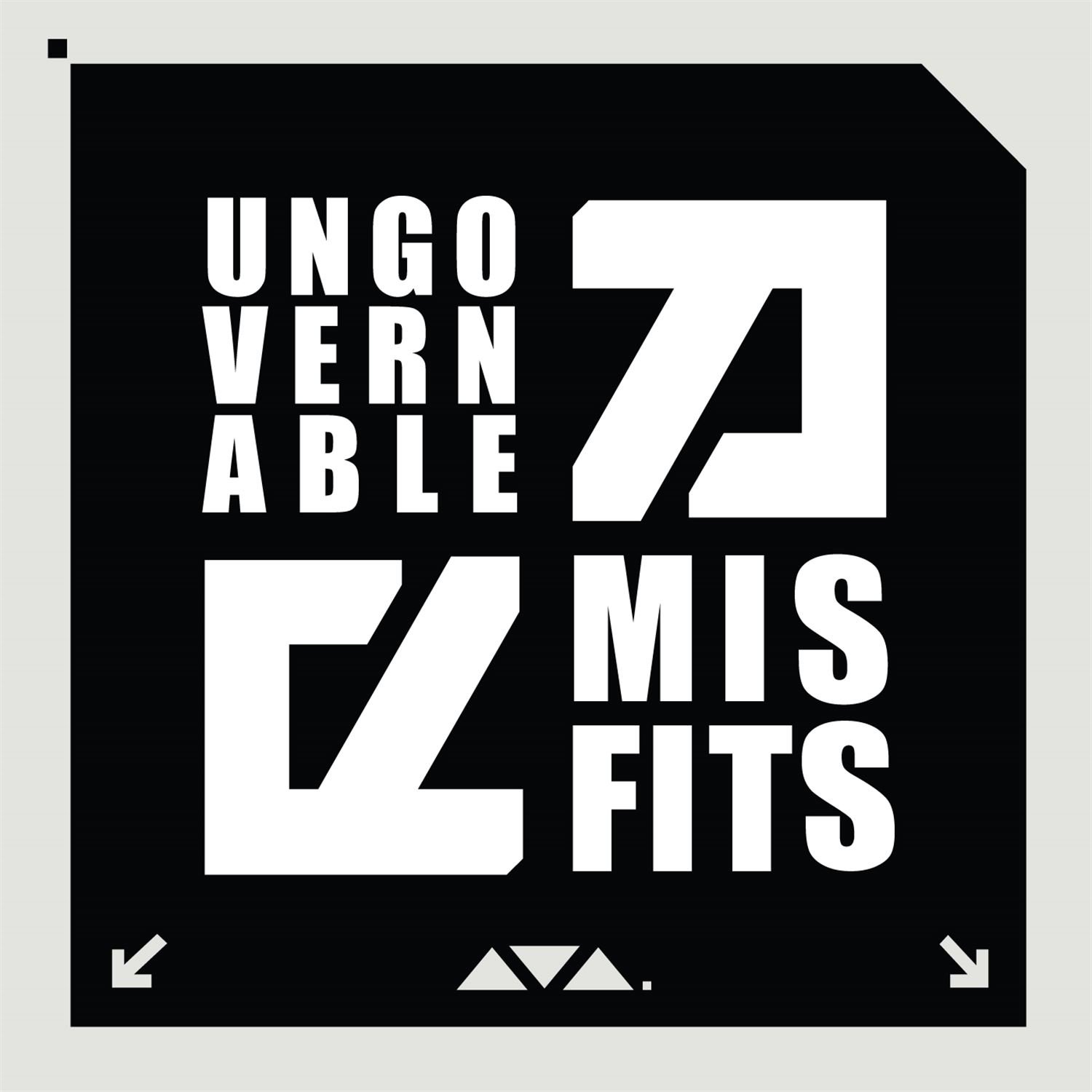
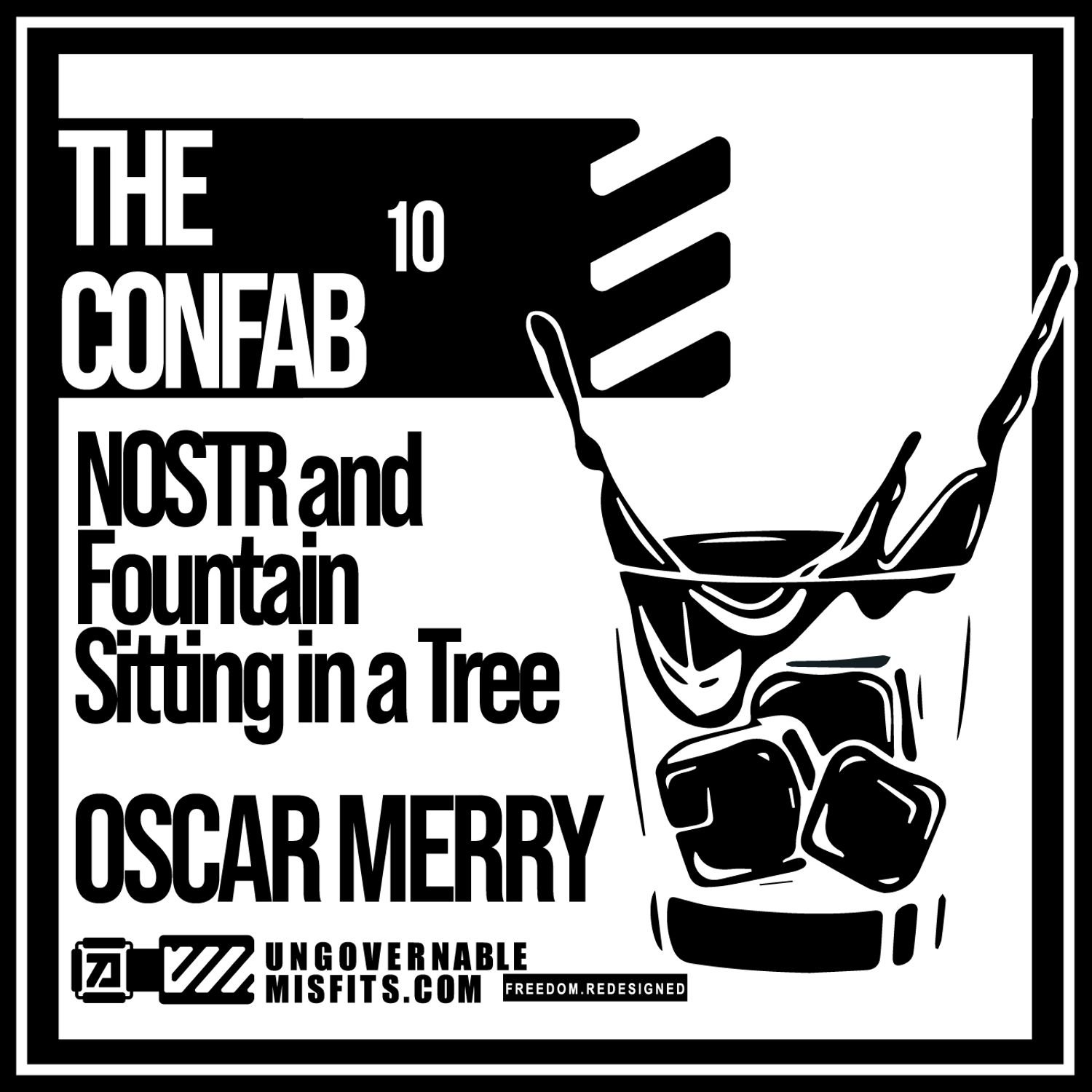
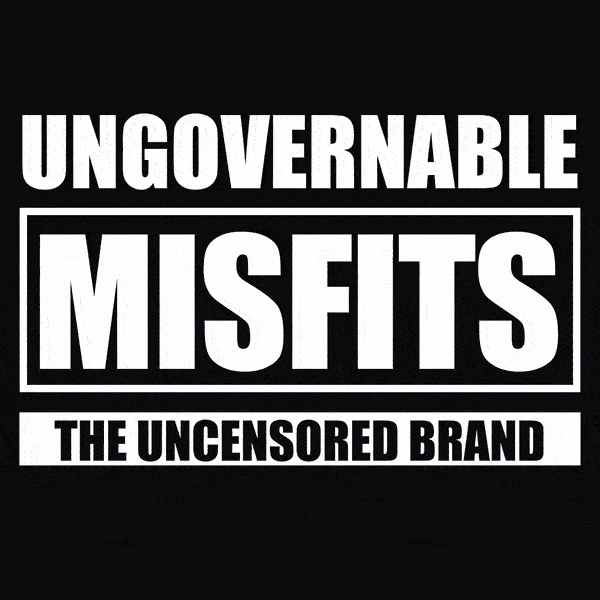

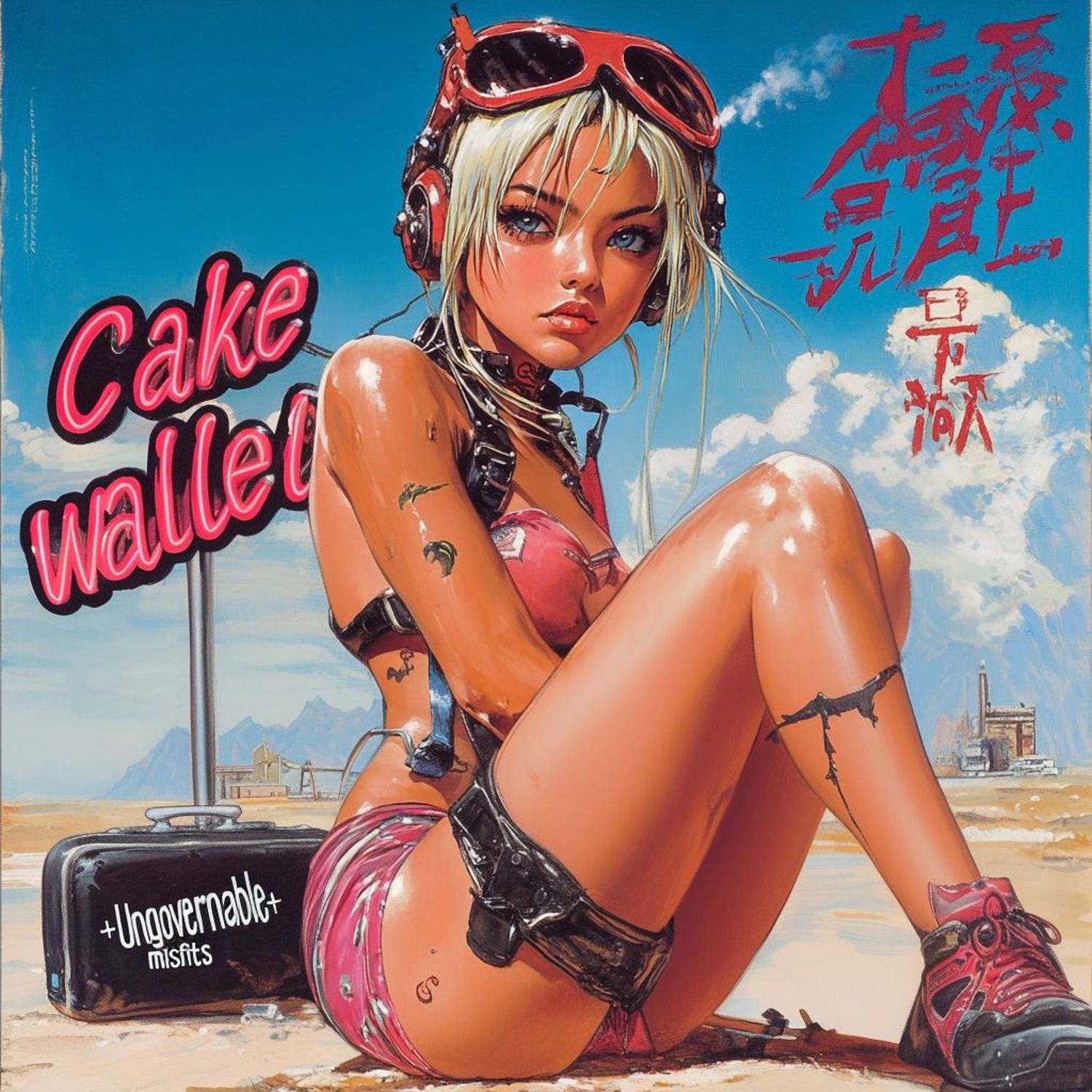
.gif)

